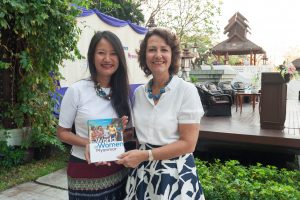Interview with the Irrawaddy
Author of the World of Women Myanmar, Carin Salerno was interviewed by the Irrawaddy.
By NYEIN NYEIN 16 January 2017
In November 2016, Women in Action Worldwide published a travelogue highlighting the experiences of contemporary female entrepreneurs, researchers, educators, artists, politicians and activists in Burma.
“The World of Women Myanmar” is a compilation of stories of women from diverse ethnic backgrounds hailing from five regions in the country: Rangoon, Bagan, Mandalay, southern Shan State’s Inle Lake, and the Irrawaddy Delta.
Author Carin Salerno has been living in Burma for more than three years, and spent two years compiling the interviews necessary to complete the book, while also working for the Swiss embassy in Rangoon. In a correspondence with The Irrawaddy’s Nyein Nyein, Salerno explained that she aims to inspire and empower women through her writing, and allow readers to discover Burma through their experiences.
Could you share what led you to compile this travelogue of these women’s experiences in Burma?
I was very impressed by the openness of women to share their stories, including sometimes very painful moments of their life. At the same time, I found that Myanmar women have a strong determination to overcome difficulties to build a better life for themselves, for their family and for their country. Moreover, they have a high level of resilience, and are all committed to bringing about peace and understanding—each one in a different way and with various very personal strategies.
What are some particularly interesting details you discovered about the women you profiled in the book?
Many women draw their inspiration and strength from the extraordinary role model who now leads their country, Daw Suu, and each of the women whose stories are voiced in the book are examples of determination, resilience, creativity, empathy and vision: they have inspired me and I hope they will inspire women in Myanmar and worldwide.
This is the second such book, following “The World of Women Tanzania.” Are there similarities and differences amongst the women featured in these travelogues, which transcend geographical and cultural differences?
Beyond borders and across continents, I find that there are a lot of similarities in the strategies of women to lead their lives. Their priorities are often bound to their responsibilities towards their family, caring for their parents, sending their children to school and giving them a good education and health care. [These are] prime targets of women worldwide. The other common feature is that women across the world are willing to share: their experiences, their intelligence, their wealth. As Fatima, a coffee grower in Tanzania, voices, “Happiness is the number one priority, money is nothing. If you have some, share it, share your intelligence to improve the loving conditions of those in need in the world.” Yin Myo Su, a hotelier in Inle Lake said, “when you are sharing, you are caring; women, we have to help each other!”
Why did you feel the experiences of these women needed to be documented?
By giving a voice to the women who tell their own stories, the book brings to light their unique role and contribution to their country. It does so in a form accessible to the wider public, women and men, reflecting on the way women have conducted their life journeys over the past 50 years and today, in a very personal, evocative way, with a positive spirit and a lot of laughter.
Is there a Burmese version of the book, too?
Not yet.
What is the Swiss Agency for Development and Cooperation doing to support women in Burma?
Through its domains of work—vocational training, agriculture, health, local governance and peace promotion—the Swiss cooperation program supports the set up of training courses that will increase the opportunities of more women to have access to skills for better employment and self employment. [It also supports] improved knowledge and training of women farmers, so that they can be better organized and knowledgeable to produce better quality products, and become stronger in trading their crops to earn higher incomes. The Swiss cooperation supports women to be competent and equal actors in the peace process and to have access to leadership positions in local administration and in political processes overall. Switzerland is also committed to ending gender-based violence and to achieving equal access (of women and men) to land.
As someone who works both in international development and as an author, how do you describe yourself, personally and professionally?
I love listening to people, women in particular, and I am very happy to pass women’s stories on to the wider public. I love writing. I hope that the stories of the book will inspire many other women as they inspire me.
I am no expert: the people of Myanmar know what best suits them as individuals, as members of their community and of their country to bring about peace, democracy and prosperity for all.
I see myself as a facilitator. I can share my experiences of working in other countries, but Myanmar people from all ethnic groups know what is best for them, valuing their rich diversity and building a peaceful, democratic prosperous future for all.

